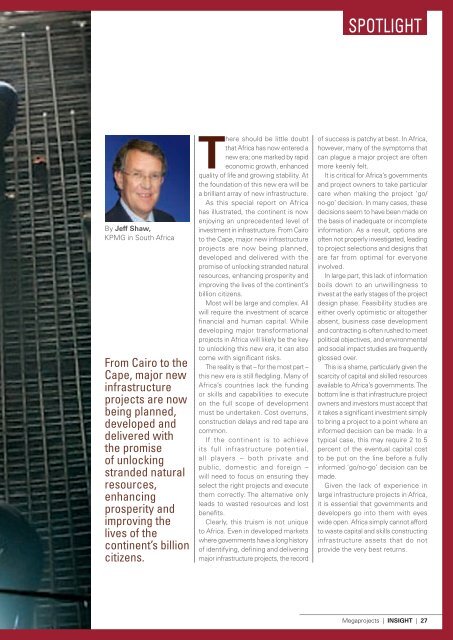Megaprojects - KPMG
Megaprojects - KPMG
Megaprojects - KPMG
Create successful ePaper yourself
Turn your PDF publications into a flip-book with our unique Google optimized e-Paper software.
SPOTLIGHT<br />
By Jeff Shaw,<br />
<strong>KPMG</strong> in South Africa<br />
From Cairo to the<br />
Cape, major new<br />
infrastructure<br />
projects are now<br />
being planned,<br />
developed and<br />
delivered with<br />
the promise<br />
of unlocking<br />
stranded natural<br />
resources,<br />
enhancing<br />
prosperity and<br />
improving the<br />
lives of the<br />
continent’s billion<br />
citizens.<br />
There should be little doubt<br />
that Africa has now entered a<br />
new era; one marked by rapid<br />
economic growth, enhanced<br />
quality of life and growing stability. At<br />
the foundation of this new era will be<br />
a brilliant array of new infrastructure.<br />
As this special report on Africa<br />
has illustrated, the continent is now<br />
enjoying an unprecedented level of<br />
investment in infrastructure. From Cairo<br />
to the Cape, major new infrastructure<br />
projects are now being planned,<br />
developed and delivered with the<br />
promise of unlocking stranded natural<br />
resources, enhancing prosperity and<br />
improving the lives of the continent’s<br />
billion citizens.<br />
Most will be large and complex. All<br />
will require the investment of scarce<br />
financial and human capital. While<br />
developing major transformational<br />
projects in Africa will likely be the key<br />
to unlocking this new era, it can also<br />
come with significant risks.<br />
The reality is that – for the most part –<br />
this new era is still fledgling. Many of<br />
Africa’s countries lack the funding<br />
or skills and capabilities to execute<br />
on the full scope of development<br />
must be undertaken. Cost overruns,<br />
construction delays and red tape are<br />
common.<br />
If the continent is to achieve<br />
its full infrastructure potential,<br />
all players – both private and<br />
public, domestic and foreign –<br />
will need to focus on ensuring they<br />
select the right projects and execute<br />
them correctly. The alternative only<br />
leads to wasted resources and lost<br />
benefits.<br />
Clearly, this truism is not unique<br />
to Africa. Even in developed markets<br />
where governments have a long history<br />
of identifying, defining and delivering<br />
major infrastructure projects, the record<br />
of success is patchy at best. In Africa,<br />
however, many of the symptoms that<br />
can plague a major project are often<br />
more keenly felt.<br />
It is critical for Africa’s governments<br />
and project owners to take particular<br />
care when making the project ‘go/<br />
no-go’ decision. In many cases, these<br />
decisions seem to have been made on<br />
the basis of inadequate or incomplete<br />
information. As a result, options are<br />
often not properly investigated, leading<br />
to project selections and designs that<br />
are far from optimal for everyone<br />
involved.<br />
In large part, this lack of information<br />
boils down to an unwillingness to<br />
invest at the early stages of the project<br />
design phase. Feasibility studies are<br />
either overly optimistic or altogether<br />
absent, business case development<br />
and contracting is often rushed to meet<br />
political objectives, and environmental<br />
and social impact studies are frequently<br />
glossed over.<br />
This is a shame, particularly given the<br />
scarcity of capital and skilled resources<br />
available to Africa’s governments. The<br />
bottom line is that infrastructure project<br />
owners and investors must accept that<br />
it takes a significant investment simply<br />
to bring a project to a point where an<br />
informed decision can be made. In a<br />
typical case, this may require 2 to 5<br />
percent of the eventual capital cost<br />
to be put on the line before a fully<br />
informed ‘go/no-go’ decision can be<br />
made.<br />
Given the lack of experience in<br />
large infrastructure projects in Africa,<br />
it is essential that governments and<br />
developers go into them with eyes<br />
wide open. Africa simply cannot afford<br />
to waste capital and skills constructing<br />
infrastructure assets that do not<br />
provide the very best returns.<br />
<strong>Megaprojects</strong> | INSIGHT | 27





![[2012] UKUT 399 (TCC)](https://img.yumpu.com/51352289/1/184x260/2012-ukut-399-tcc.jpg?quality=85)





![Neutral Citation Number: [2009] EWHC 3198 (Ch) Case No: CH ...](https://img.yumpu.com/50120201/1/184x260/neutral-citation-number-2009-ewhc-3198-ch-case-no-ch-.jpg?quality=85)





